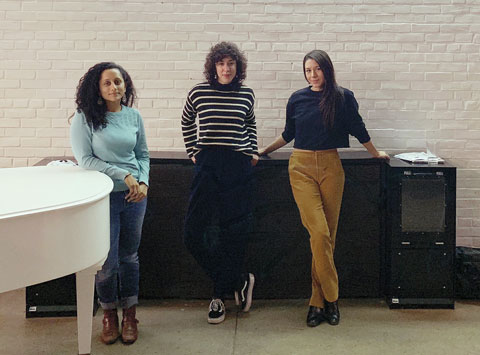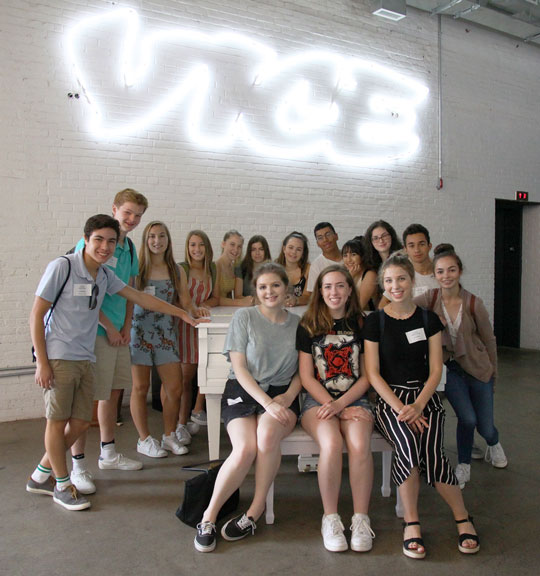ON LOCATION - August, 2018
VICE - Defying Norms
FastForward speaks with three on staff that help make it happen
WRITERS/REPORTERS: Kylar Flynn, Brandon Lopez, Kyle Austin, Simone Harper, Angie Gonzalez, Jacqui Martin, Lauren McKechnie, Claire McKechnie, Samantha Michaels, Josh Santos, Anna Silverman and Lilli Wanninger
Within the halls of Brooklyn, NY’s media juggernaut VICE, content which defies the norms of journalism and visual entertainment is being made every day around the clock. News, entertainment, technology, food, you name it; if it’s something you’re interested in, odds are VICE has a video covering it. Since its founding in 1994, the company has cemented itself as a beacon of compelling storytelling thanks to its knack for taking risks and chasing the stories most others don’t dare try. For one morning, we were given an inside look at this process, what propels VICE to report on what they do, and what has made them the un-matched news corporation among young adults, millennials, and beyond. As we explored the New York HQ’s vast offices, we were greeted by our interviewees, three amazing women that help keep one of the world’s most popular news sources running. We sat down in a sunny, glass exposed room to hear about their unique experiences, as well as what it takes to become a VICE reporter. Dory Carr-Harris, Michelle Leung, and Ankita Rai now faced us one on one, each woman helping put a human face on what can (from the outside) seem like pure smoke and mirrors in terms of just how much content their company generates on a regular basis.

(L–R) Ankita Rai, Dory Carr-Harris, Michelle Leung ~ Photo: Elizabeth Renstrom
Dory Carr-Harris spoke first, explaining her role within VICE’s greater framework: “I’m the executive editor of VICE in the US,” she explained, “… I oversee all the content that we’re putting out… and make sure that everything we put on our websites is in line with all the cool videos we’ve already put up there.” We were astounded at the degree of responsibility and hard work such a position implied. Dory summarized it best herself: “No day looks the same for me.”
Michelle Lueng is a producer on Vice.com. “I primarily create video content, but my work can be found across any of our Vice.com channels. Noisey, Broadly, Tonic, you name it.” How does Michelle ensure that quality and brand are maintained throughout a process that covers so many different types of VICE content? The answer is more philosophical than you may assume. “I think,” she began, “What comes across is if you’re genuinely curious on what you’re covering. People recognize that, and our success has come greatly from that.”
Ankita Rai, our third interviewee, also heavily works in production as a Special Project Editor at VICE Digital. Echoing the sentiment of her colleague, she said, “VICE is a fearless company. We are built on these documentaries going places that nobody else was going, reporting on the ground… it allowed, and allows, us to leave a lot of room for experimentation.” This ethos, as Ankita described, seems to run through every department of VICE’s inner workings. As long as each member of the team remains diligent and committed to VICE’s history of distinguished storytelling, then their company will continue on its legacy of reporting what others won’t, and giving platforms to those who have none.
We want to be an accurate reflection of what this generation is. I think one way we do that is by giving a voice to people who don’t necessarily have one.
The power of VICE’s reporting, while heavily from its unique content, is also strengthened by a strong multimedia sensibility. Dory described some of the different mediums in a way that, contrary to many attitudes about television, internet, and audio entertainment, views them as complimentary and in harmony with one another. “The audio medium is so evocative. Reading something on a page can be amazing, a very emotional experience. Hearing someone’s voice can be an emotional experience. And being able to translate what someone’s going through by not just seeing, but absorbing a visual while you walk alongside their experience on screen, that’s unparalleled in visual media. Each medium has its role in telling story, and they’re all so different and full of potential.” Such a wide eyed explanation once again evoked Michelle’s words about genuine interest in your reporting and content. A love for not only the story, but the form of reporting it was clearly a huge part of each woman’s life across from us—their determination, and youthful enthusiasm, only inspired us more.
Want to be a reporter?
…Never stop learning, never stop exploring, never stop being curious and reading voraciously. Being informed is the most crucial way to start..
As our interview came to a close, we couldn’t help but ask for some practical advice on how one can work their way to become a VICE reporter, editor, or producer. Ankita herself went to journalism school, but actually recommends not going/diving head on into the field. While this is certainly an intimidating thought, none of us could deny that, once again, the word fearless crossed our minds while listening to her. Leaving us with more broad advice, Dory urged us on: “Never stop learning, never stop exploring, never stop being curious and reading voraciously. Being informed is the most crucial way to start.” So if you want to become a VICE reporter one day, keep informed, and keep passionate. Start by reading, then write, then observe, and begin all over again. If you love journalism and your work, and want to make the world a better place, then VICE Media may just be the place for you.

